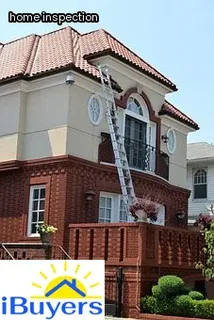Negotiating home repairs after a home inspection can be beneficial in many ways; it allows you to save money, get better repairs, and even gain additional knowledge. One of the primary benefits of negotiating is the potential to reduce costs.
By talking directly with the contractor or service provider, you may be able to negotiate discounts on materials or labor costs. Additionally, negotiating can help you ensure that your repairs are done correctly and to a high standard - as you can request specific materials and brands for the job.
Lastly, when you negotiate repairs with a contractor yourself, it gives you an opportunity to gain more knowledge about your home so that in the future, you can take on any small repair jobs yourself. Negotiating home repairs after a home inspection is definitely worth considering if you want to save money while making sure that quality workmanship is done.

Before requesting repairs from the seller after a home inspection, there are several factors to consider. One important factor is the age and condition of the house.
The buyer should realistically assess how much work needs to be done and what it will cost. It is important to understand that some issues may not be considered a major concern for negotiation purposes, such as small cracks in plaster walls or minor roof damage.
Additionally, buyers should try to focus their negotiations on areas where there is potential for large savings or significant improvements in safety and comfort. Buyers should also take into account potential repair costs associated with items that may not have been uncovered during the inspection, as well as any necessary upgrades such as new appliances or fixtures.
Ultimately, buyers need to be prepared to argue for any repairs they feel are worth negotiating for in order to get the best deal possible for their new home.
Before making a repair request after a home inspection, it is essential to take the proper steps to ensure the best outcome. It is important to thoroughly review the home inspection report and create an accurate list of repairs that need to be addressed.
Additionally, it is necessary to prioritize these items and determine which ones are most important. Research should also be done on average market costs for the repairs in order to avoid being overcharged.
Once all of these steps have been taken, homeowners can then proceed with requesting specific repairs from a contractor or seller. Furthermore, it is essential to discuss payment terms with the contractor before any work begins and always remember to get everything in writing.
Negotiating home repairs after a home inspection takes knowledge, preparation and patience but following these steps will help lead to success.

Successful negotiations with the seller after a home inspection require a clear understanding of your rights as a buyer. It is important to remember that you are in control and can use the results of the inspection report to leverage better terms for yourself.
Before you enter into any negotiations, make sure you have read through the contract and familiarize yourself with its terms. Preparation is key to successfully negotiating repairs with the seller.
When discussing repairs, be sure to stay focused on what needs to be done and don’t let emotions get involved in the conversation. Be direct while also being polite; try not to make too many demands or ask for too much at once.
Make sure you understand what’s expected of both parties, including deadlines and payment details, before agreeing to anything. Lastly, take your time throughout the negotiation process and don’t rush into making decisions without first considering all your options.
Negotiating the repairs that come up during a home inspection can be a tricky situation, but with the right strategies, it doesn't have to become a conflict. One of the most important skills to have in this process is effective communication.
Understanding what each party is trying to convey and being clear in your own words will help you navigate any disagreements and ensure that everyone's needs are respected. Additionally, keeping an open mind and being willing to compromise on certain issues can help you reach an agreement faster.
Both parties should also be prepared for the negotiation process and understand their rights, responsibilities, and options. Taking time to fully research the issue at hand will give you an edge during negotiations and allow you to make informed decisions.
Lastly, staying organized by creating a plan or timeline for completing needed repairs can help keep everyone on track towards achieving mutual goals. By following these strategies, negotiating home repairs after a home inspection can remain peaceful instead of turning into an argumentative battle.

It is important to have a clear understanding of expectations when negotiating home repairs after a home inspection. Setting expectations with the seller is an essential step in ensuring that both parties are on the same page and that the repair process runs smoothly.
To ensure that expectations are set correctly, it is important for the buyer to discuss their needs and wants with the seller before signing any paperwork. Additionally, it is beneficial for both parties to review any inspection reports or estimates from contractors before beginning negotiations.
During this time, buyers should make sure to understand what repairs the seller plans to cover, if any, and what types of materials or products will be used during the repair process. By having a clear understanding of these details up front, buyers can avoid miscommunication and costly delays during negotiations.
Researching the repairs that have been made to similar homes is a great way to get an idea of what kind of repairs you may need to negotiate after a home inspection. While it's important to take the inspector's report into consideration, it's also beneficial to do your own research by looking into other homes in the area that are comparable in size, age and condition.
Looking at repair records can help give you insight into what might be necessary for your own home. From there, you can talk with contractors and compare their estimates and services to find one that fits your budget.
Additionally, researching local building codes can help you better understand any necessary repairs or upgrades that must be done according to code. This knowledge can make all the difference when negotiating home repair costs with a seller after a home inspection.

Having an expert home inspector assess a home before buying can be invaluable. An experienced eye is needed to identify any potential issues with the property that could be costly to repair after purchase.
A home inspector will look for structural problems, such as cracks in the foundation or roof damage, plumbing and electrical systems that may need replacing, and other safety hazards that could put lives at risk. They can also spot issues with appliances such as water heaters and furnaces, which could save thousands of dollars in repairs down the road.
Knowing what needs to be done ahead of time allows buyers to use their knowledge as leverage when negotiating repairs with the seller after inspection, making it easier to get a favorable outcome for both parties. Furthermore, having an expert on hand during negotiations ensures that all details are taken into consideration and no stone is left unturned.
A home inspector is obligated to provide a thorough and objective evaluation of the condition of a property. This includes inspecting the structure, systems, and components of a house.
They must also describe any visible defects or deficiencies that are found during the inspection in a written report. A qualified professional should also be able to explain the impact of these issues to potential buyers and inform them on how they can address them.
Home inspectors should also make sure that they adhere to all applicable codes and regulations when conducting an inspection as well as any specific requirements outlined in the inspection agreement. Homeowners should be aware that home inspectors are not responsible for estimating costs related to repairs or replacements, but can help them better understand what kind of work may need to be done in order for them to successfully negotiate their home repair costs.

When it comes to negotiating home repairs after a home inspection, there are several categories of necessary repairs that need to be taken into account. These range from major structural issues such as foundation problems or roof damage, to smaller cosmetic issues like chipped paint or missing shingles.
Additionally, the presence of hazardous materials such as asbestos and lead-based paint can also necessitate a full repair and removal. Depending on the age of the home and its location, any mechanical systems such as HVAC, plumbing, or electrical may also require professional intervention in order to bring them up to code.
Lastly, pest infestations should always be addressed immediately in order to prevent further damages to the structure of the home. Taking all these categories of necessary repairs into consideration when negotiating with contractors will ensure that your home is safe and secure for years to come.
When negotiating repairs after a home inspection, delays are inevitable. It is important to prepare for these delays in order to ensure that all repairs will be completed and still meet the agreed-upon deadline.
One way to do this is by making sure that the scope of work is clearly defined and agreed upon before signing any contracts or agreements with contractors. This includes understanding the timeline for completion of each repair and any contingencies that may arise.
Additionally, it's important to keep an open line of communication with contractors throughout the negotiation process - if there are any unexpected delays, both parties should be aware of them as soon as possible so that they can adjust their plans accordingly. Lastly, it's a good idea to have a backup plan in place in case certain repairs take longer than expected or are unable to be completed by the original deadline.
Having a contingency plan can help reduce stress and frustration when negotiating home repairs after a home inspection.

Negotiating home repairs after a home inspection doesn't have to be difficult if you follow the right steps. It's important to remain proactive and organized for successful negotiations with the seller.
Begin by understanding what types of repairs are necessary and know your limits in terms of cost and timeframe. Once you have a clear idea of what you can afford, make sure to communicate that clearly and concisely with the seller.
Be prepared to compromise on certain items if necessary, but also be aware of any red flags that could indicate a seller who is unwilling or unable to negotiate. Additionally, it's important to be informed about any local regulations or laws that may impact the repair process before making any offers or commitments.
By following these simple tips, you can ensure that your negotiations with the seller will go smoothly and successfully.
When estimating costs and time frames for home repairs after a home inspection, it is important to research standard repair costs and obtain bids from contractors. Take into account the cost of labor, materials, permits, as well as any additional services needed.
Knowing the typical market rates for the type of repair you are planning can help you negotiate with contractors to get the best deal. In addition to researching repair costs, you should also factor in any applicable taxes, warranties, or service agreements when calculating your total expected expenses.
It is also helpful to consider any discounts or special offers that may be available through the contractor. When discussing time frames for repairs with contractors, be sure to make realistic expectations and ensure that they have a clear understanding of your timeline.
By following these tips, you will be better prepared to negotiate home repairs after a home inspection in an informed manner.

As a buyer, it is important to understand your rights when negotiating home repairs after a home inspection. The most successful negotiations are based on knowledge of the contract and the seller’s obligations.
You may have the right to acceptance or rejection of repair requests, and should be sure you understand the language used in the contract so that there is no confusion about what is being agreed upon. When making repair requests, be sure to specify whether you want them completed before closing or if you are willing to pay for them after closing.
Additionally, it is important to know how much time you will have to make these decisions and the consequences of not meeting any deadlines. It is also wise to ask for more than what you initially think may be needed in case unexpected costs arise during repairs.
Finally, if possible, try and get a written agreement from both parties that includes all of the elements of the negotiation process. With this understanding of your rights as a buyer during negotiations, you can ensure that your investment in a new home is protected.
When it comes to evaluating quotes from general contractors for home repairs, there are several things to consider. Price isn't always the most important factor, as you should also look at the contractor's availability, experience, and reputation.
It's wise to get a few different estimates so that you can compare offers and select the contractor who best meets your needs. Make sure to read over all the details of each quote to ensure that you understand what is included in the repair services.
Consider asking for references from other clients and checking online reviews. Ask questions about the materials being used and any relevant warranties or guarantees.
Taking these steps can help you negotiate a good deal on necessary home repairs after a home inspection, allowing you to make necessary fixes without breaking your budget.

Finding an expert to assist with negotiating for repairs after a home inspection can be an invaluable resource. Experienced professionals understand the complexities of real estate law, enabling them to help you get the most out of your negotiation.
They can survey the damage and advise on what needs fixed and what is fine as is. Additionally, they can help determine whether you should seek compensation for additional costs you may incur due to faulty repairs or damage that was not specified in the contract.
Furthermore, an expert negotiator will be able to identify potential flaws in the inspection report that could allow you to recoup more money from the seller if necessary. In addition to helping you get the best possible outcome from your negotiation, experienced negotiators also have access to resources like contractors and tradespeople who specialize in home repair and renovation so they can ensure that any necessary repairs are done correctly and efficiently.
When it comes to negotiating home repairs after a home inspection, it's important to consider why the seller might reject your request. Common reasons for sellers to turn down requests for repairs can include not wanting to spend the money on costly repairs, fear of being taken advantage of, and feeling obligated to get the sale done quickly.
Sellers may also be concerned that making repairs could open up potential liabilities or legal issues if something goes wrong after the sale is finalized. In some cases, sellers may not have an understanding of the repair needs or even be aware of them until pointed out by a home inspector.
Ultimately, sellers may see little benefit in making requested repairs and instead opt to just lower their asking price accordingly.

When it comes to negotiating home repairs after a home inspection, the pros and cons of accepting a credit from the seller instead of making the repairs must be considered. On one hand, opting for a credit from the seller can be more cost-effective and efficient as it allows buyers to purchase their own materials and hire their own contractors.
Additionally, buyers may have better control over quality when taking this route. On the other hand, some sellers are only willing to offer credits for a fraction of the total repair costs.
This means that buyers may need to put in extra time and money to make up for any significant difference between the amount offered and what is actually needed for repairs. Furthermore, certain types of home repairs require special licensing or skills which might not be available with private contractors.
Ultimately, buyers must carefully weigh their options before deciding whether or not to accept a credit from the seller instead of making repairs.
Exploring alternatives to traditional repair negotiation processes is a great way to ensure you get the most out of your home inspection and repairs. Many homeowners opt for the standard negotiation process, which can often leave them feeling shortchanged or frustrated with the results.
A new approach to negotiating home repairs after a home inspection can help you get the most out of your repair project. Consider looking into alternative methods such as cost sharing, bartering services, or utilizing contractors who specialize in specific trade skills.
Utilizing these methods can help you get the best possible outcome for your repair needs while still staying within your budget. There are also many online resources that provide helpful tips and techniques for negotiating home repairs after an inspection, so it pays to do some research before entering into any agreement.
With a bit of creativity and savvy negotiation skills, you can find yourself with more favorable terms and better outcomes when dealing with home repair negotiations after an inspection.

When it comes to negotiating home repairs after a home inspection, there are many misconceptions that can lead to costly mistakes. It is important to understand the process of negotiating repairs and the steps you should take following an inspection in order to ensure that you get the best possible outcome.
First and foremost, it is important to remember that a home inspector’s job is not to find every single issue with a property, but rather just those major defects which could potentially affect the value or safety of the home. Additionally, keep in mind that a home inspector will never make any recommendations as to how an issue should be addressed or who should be chosen for any repair work, so it is up to you as the buyer or seller to make those decisions.
Furthermore, while some states may require sellers to address certain issues before closing on a sale, there are limits as to what they can be held responsible for, so it’s important not to expect too much from a seller in terms of negotiation when it comes time for repairs. Lastly, if an issue does come up during inspections that needs repair work in order for the sale of the house to go through, buyers should consider their options carefully and seek out bids from multiple contractors before making any final decisions on who will do the job.
Negotiating repairs for your home after an inspection is a process that requires both knowledge and skill. Knowing the right questions to ask and understanding the answers will help you get the best deal possible.
To start, be sure to understand what exactly is included in the inspection report. Knowing what issues are found in the home can help you identify which ones should be addressed first during negotiations.
Additionally, research contractors and repair costs before talking with potential contractors so that you have a better idea of how much it may cost to make necessary repairs. Lastly, don’t forget to ask about any warranties or guarantees when negotiating repairs after an inspection – this could save you money down the road if something needs repairing again in the future.
By following these steps, you can ensure successful negotiations and keep costs low while still making sure your home is safe and secure.

Yes, it is normal to negotiate after a home inspection. Home inspections are often the first step in purchasing a new home and can reveal any potential issues that need to be addressed.
If repairs need to be completed before closing, it is common for both buyers and sellers to negotiate who will pay for the repairs or if the cost of the repairs should be deducted from the purchase price. Negotiating repair costs after a home inspection can help you save money and get your dream home at a lower cost.
Before negotiating, it is important to understand the terms of your contract and consult with an attorney or real estate agent if you have any questions. Being prepared with knowledge of local building codes and regulations can also help you in negotiations.
Additionally, you may want to consider hiring an independent inspector for a second opinion on what needs to be repaired and how much it will cost. With proper preparation and negotiation skills, buyers can successfully reduce the cost of necessary repairs and make their dream home more affordable.
When it comes to home repairs after a home inspection, many sellers may be willing to negotiate. Although the buyer is typically responsible for any repair costs that arise from an inspection, there are a few secrets of negotiating home repairs which could save money for both parties.
First and foremost, buyers should remember that sellers are likely feeling just as anxious as they are about the results of an inspection. In some cases, sellers may be willing to cover some or all of the costs associated with certain repairs if they believe it will help them make a sale faster.
Additionally, buyers should consider asking for cash credits instead of hiring contractors to do the work in order to get a better deal on repairs. Lastly, buyers should remain professional and courteous throughout negotiations so as not to offend their potential seller; this includes being prepared with documentation such as receipts and estimates for the requested repairs.
It's important for buyers to remember that negotiating home repairs after an inspection can be a lengthy process but by approaching the situation with patience and understanding, both parties can come away feeling satisfied with the outcome.
When it comes to negotiating home repairs after a home inspection, there are certain red flags that should be addressed. Common issues to look out for include: structural damage, roofing problems, electrical wiring defects, plumbing deficiencies, and pest infestations.
It’s important to understand the severity of any issues discovered during a home inspection before making repairs or attempting to negotiate a lower sale price. Structural damage such as cracks in walls or floors can indicate foundational issues that could potentially be costly and time-consuming to repair.
Roofing problems such as missing shingles or leaking gutters should also be noted and may require immediate attention. Electrical wiring defects can present safety hazards and should always be inspected by a qualified electrician.
Plumbing deficiencies such as leaking pipes or low water pressure can cause extensive damage if not dealt with promptly. Finally, pest infestations can pose health risks and spread quickly throughout the house if left unchecked.
By being aware of these common red flags in a home inspection, you will be better prepared to negotiate home repairs confidently and effectively.
A: Your realtor should have the experience and know-how to help guide you through the negotiation process. Depending on your situation, they may recommend negotiating with the seller directly or working with your lender to get the repairs covered by your home loan.
A: Depending on the results of the home inspection, you may need to make repairs or upgrades to your air conditioning, heating, and/or ventilation systems. You can negotiate with the seller to determine who will cover the costs of these repairs.

A: During the home inspection transaction, you may request a price reduction or negotiation of repairs related to termites, mold, and tiles. You may also ask the seller to cover the cost of any repairs related to these issues.
A: It is important to review the home inspection report and identify any necessary repairs. You can then discuss these items with the seller and negotiate a fair resolution that works for both parties.
A: Negotiating repairs after a home inspection is all about being prepared. Make sure to research the cost of any necessary repairs before making an offer on the home. If you are asking the seller to cover some of these expenses, be specific about what you expect them to cover and include it in your written offer. Be aware that many local laws require sellers to disclose information about lead paint or pest problems. If you have concerns about these matters, make sure your purchase agreement includes language that clearly spells out who is responsible for addressing the issue.
A: Ask your real estate agent to add a contingency in the purchase agreement requiring the seller to make any necessary repairs to the footings before closing. Your real estate agent can help you determine an appropriate amount to put in escrow in order to cover the costs of these repairs.
A: You should ensure that all emails regarding the negotiation of repairs after a home inspection explicitly state that all parties are consenting to the sharing and usage of any data included.
A: You will need to discuss the findings of the home inspection with the seller and make an offer to cover the cost of repairs. Be sure to document any agreement in the final sale contract.
A: When negotiating repairs after a home inspection, you should consider the costs involved as well as the potential risks of any fire hazards. Make sure to conduct your own due diligence by researching the estimated costs for each repair and shop around for competitive pricing. Additionally, be aware of any potential fees associated with making these repairs and factor them into your calculations.
A: You should ask the seller directly for a price reduction to cover the cost of repairs. Be sure to provide evidence of the problems uncovered in your inspection and be prepared to negotiate.
A: If you are buying a house that is on the market in a buyers market, you will likely have more negotiating power when it comes to repairs after a home inspection. You may be able to ask for repairs to be completed or covered by the seller, use your home inspection contingency clause in your purchase contract, or ask for monetary compensation to cover any repairs.
A: The buyer's real estate agent can work with the seller's real estate agent to negotiate a fair cost of any necessary repairs after the home inspection.
A: After a home inspection, you should review the report and identify any items that need to be addressed. You can then ask the seller to make the necessary repairs or provide a credit for their completion.
A: Negotiating repairs after a home inspection with a home inspection contingency typically involves the buyer submitting a repair request to the seller. The seller can then either accept or reject this request, and if accepted, will likely propose covering some of the cost of the repairs. If the buyer is unable to agree on acceptable terms, they may need to cover the full cost of any necessary repairs.